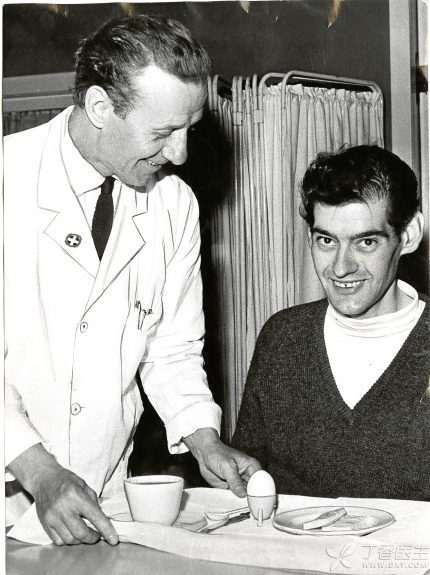
Scientific common sense tells us that human life cannot be separated from food and water.
Then the question arises, how long can a person not eat?
Dr. Clove came to tell you.
Angus Barbier, a 27-year-old Scottish young man, was reduced from 207 kg to 82 kg by completely cutting off food between 1965 and 1966, and… was alive.

This is probably the longest case in history in which medical research records can be tested.
To, bottom, yes, more, less, heaven, what?
The answer is …
382 days
Surprised or not? Not surprisingly?
This is the story.
One day in 1965, AB came to Maryfield Hospital of Dundee University Medical School, hoping to solve his severe obesity problem.
At first, the doctor only planned to use a short-term diet cut-off therapy to help him lose weight, because most people could not even stick to it for two or three days.
-
Don’t eat anything during the food cut-off period.
-
Only water and some non-calorie drinks can be drunk.
-
Doctors require various vitamins, potassium, sodium and other mineral nutritional supplements.
-
No other drugs were taken.
Then, AB really persevered and her weight fell off quickly. Interestingly, starvation did not bring much discomfort to the young man.

After that, AB certainly wanted to lose weight. He told the doctor that he still wanted to continue to cut off food and reduce to his ideal weight.
Under normal circumstances, doctors will definitely not agree, because the health risks of long-term food cut-off are very high.
Just never expected, probably think this young man may seem like… a little skeleton clear, gifted appearance, the doctor also agreed to him!
What was even more unexpected was that the food cut-off lasted 382 days carelessly.
Don’t doubt the authenticity of this figure, because there have always been data records, and the test results reviewed many times all tell us that AB really didn’t steal anything.
In AB’s own words, he has long forgotten the taste of food.
What happened to AB after the food was cut off?
Average 37 ~ 48 days
Only one defecation
Of course, this is the late period of food cut-off.
At first, AB lived in the hospital and received regular monitoring and examination by doctors, including blood and urine, and recorded various physical conditions. After a short time, he was discharged from the hospital and returned home, and then went to the outpatient department regularly for reexamination.
The valuable examination records during this period later became scientific documents and were published in medical journals. Let’s take a look at them together.

First, hypoglycemia.
His blood sugar first dropped to about 2.8 mmol/L, reached 1.7 mmol/L at the fourth month after he stopped eating, and then remained at a stable level.
However, AB always felt good about himself and did not show what’s physical symptoms. Doctors also measured his sugar metabolism and the results were not obvious abnormalities.
Then, hypokalemia.
If the blood potassium is too low, it may cause pathological changes of the whole body organs and systems, muscle weakness, gastrointestinal tract function damage, etc., as well as arrhythmia and sudden death.
AB developed hypokalemia 4 months before he stopped eating, but after the doctor asked him to take potassium supplements, it remained at a stable level.
Also, high blood calcium and low blood magnesium.
AB also developed hypercalcemia, and the concentration of magnesium also decreased significantly, which has remained at a stable level since then.
Also, urea dropped.
The level of urea in AB’s blood decreased, but remained stable ever since.
Also, uric acid soared.
AB’s blood uric acid level was as high as 17 mg/dl at one time, while the average adult’s high limit would not exceed 8 mg/dl. Fortunately, he did not have gout.
… …
Do you see the most magical place?
AB’s body seems to have found a new way of substance metabolism during long-term hunger. With the support of nutritional supplements and water, his body has maintained a new electrolyte balance.
How else do you say, he is a little skeletal… … …
Some people may wonder, will the weight lost rebound?

Five years after the end of the food cut-off, the doctor re-measured AB’s weight, only recovering from 82 kg to 89 kg. Surprise or surprise?
Long-term food cut-off is a high-risk thing in itself. Why can Angus stick to it without serious complications?
First of all, he drank enough water.
The metabolism of human body cannot be separated from water, and people who lack water cannot support it for such a long time.
Besides… he is fat!
Fat people have the survival advantage of fat people since ancient times. They can mobilize the substances stored in their bodies to supplement the electrolytes they lack when hungry. The decomposition of fat can also provide energy for themselves.
Also, this legendary success cannot be separated from…
Regular medical monitoring, necessary nutritional supplements, and very, very special personal constitution and tenacious perseverance.
You know, the safety of losing weight by cutting off food has always been very poor.
Among others who also tried to cut off food during the same period, there were reports of deaths during treatment. Most of them occurred in the early stage of cutting off food or after resuming diet, and some patients also died of lactic acidosis, heart failure or intestinal obstruction.
However, after long-term hunger and malnutrition, if a person eats again, he may suffer from electrolyte disorders such as hypophosphatemia, which can be fatal in severe cases.
Safety always comes first.
Although [light food cut-off] is still an option to treat obesity, in the absence of medical monitoring and professional guidance, it is very unwise to rely on long-term hunger to lose weight at home, and even expect to [cure all diseases with hunger] or as preventive health care.
Harm of food cut-off
The direct effect of food cut-off on gastrointestinal tract has been confirmed by a large number of studies.
Under the condition of long-term lack of food and stimulation of digestive tract substances in gastrointestinal tract, intestinal mucosa will atrophy and its barrier function will be damaged, which may cause the displacement of original bacteria and toxins in intestinal tract, especially unsafe for patients with original intestinal inflammation.
The spread of intestinal microorganisms throughout the body may cause serious health damage. The food in our gastrointestinal tract itself is an important factor in maintaining and protecting gastrointestinal function. Therefore, for many patients who cannot eat, it is often recommended in medicine to provide nutritional support for patients with enteral nutrition instead of parenteral nutrition.
Many basic diseases, such as liver and kidney insufficiency and hyperthyroidism, are absolutely not allowed to stop eating.
People with anorexia should not try to cut off food either, because it may aggravate eating disorders.
For people who take drugs due to various diseases, due to their special physiological state during hunger, there may also be various unpredictable risks that are not easy to occur at ordinary times. Not to mention, pregnant women and nursing women cannot try to stop eating.
Although a large number of medical studies and dietary guidelines have set limits on the substances and energy that people consume every day, and we also know that overeating and unreasonable diet structure will endanger health, the existing studies do not think that people who eat only one meal a few days will live healthier lives.
